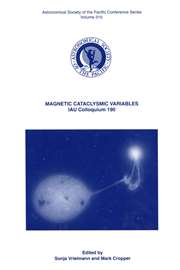No CrossRef data available.
Article contents
High Pressure Experiments for Astrophysics
Published online by Cambridge University Press: 12 April 2016
Abstract
In the past decade, measurements of the properties of H2 and He systems at very high pressures have made great progress, now reaching density at the limit of the plasma phase transition of hydrogen. The potentialities and limits of static and dynamic methods will be reviewed. Then, a survey of the major experimental results is presented. It is the intention of this article to show how these measurements can bring information to model low-mass astrophysical objects. Three levels of usefulness are distinguished on selected examples: data for codes of planetary interiors, constraints for theoretical descriptions of dense matter, observations of unsuspected properties at very high density.
- Type
- Reviews
- Information
- International Astronomical Union Colloquium , Volume 147: The Equation of State in Astrophysics , 1994 , pp. 239 - 271
- Copyright
- Copyright © Cambridge University Press 1994


